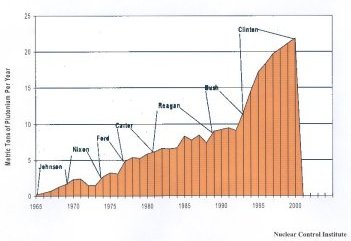
FOR
IMMEDIATE RELEASE Contact: Tom Clements
JANUARY 19,
2001
tel. 1-202-822-8444, clements@nci.org
SHIPMENT OF US-ORIGIN PLUTONIUM SET TO DEPART FRANCE
ON EVE OF PRESIDENTIAL TRANSITION;
HIGHLIGHTS
CLINTONS TROUBLING PLUTONIUM LEGACY
Washington,
DC---The second sea shipment of U.S.-origin plutonium undertaken during the
Clinton Administration is set to depart today from Cherbourg, France for Japan.
In the last half of 2000, the U.S. Government secretly reviewed and approved
security arrangements for the controversial transport, which consists of 28
mixed uranium-plutonium oxide (MOX) fuel assemblies, containing about a quarter-ton
of weapons-usable plutonium.
Shipping
plutonium around the globe in lightly armed commercial vessels presents a security as well as a proliferation threat
and results from a failed policy to curb burgeoning
plutonium stockpiles, said Tom Clements, Executive Director of the Nuclear
Control Institute (NCI) in Washington. NCI is a nuclear non-proliferation center which seeks to halt civilian
commerce in plutonium. The security
and proliferation risks of these shipments cannot be justified because there
is no energy need for plutonium use in Japan, given the glut in non-weapons-usable
uranium, said Clements.
The
shipment highlights the failure of the 1993 Clinton non-proliferation policy
aimed at halting recovery and use of plutonium and presents a challenge to the
Bush Administration to readdress plutonium policy. Internationally, weapons-usable plutonium stockpiles have more than
doubled under the Clinton Administration, to over 200 tons, with Britain, France,
Japan, Germany and Russia holding the largest stocks of this material.
Amounts of plutonium separated from spent fuel annually under the Clinton
Administration dwarf annual figures for any earlier Administration, with the
amount of civilian plutonium now rivaling stocks of weapons-grade plutonium
held by the nuclear weapons states.
World Separation of Civil Plutonium Under U.S. Presidents
Click
here for full-size color chart
Surpluses of weapons-usable plutonium continue to grow at an alarming rate given unrestrained reprocessing of spent fuel but limited use of plutonium as fresh fuel in European and Japanese reactors. Lack of constraint in plutonium stockpiling is a little-noticed non-proliferation failure of the Clinton Administration, said Paul Leventhal, President of NCI. Although the Clinton Administration turned its back on the proliferation dangers of the buildup of vast quantities of weapons-usable plutonium, we are hopeful that the Bush Administration will thoroughly review the national-security dimensions of this issue and adopt tough policies against plutonium stockpiling and use.
Under
the 1988 U.S.-Japan nuclear cooperation agreement, shipments of plutonium are
to be undertaken only with an armed escort vessel, but the State Department
has reinterpreted the agreement to allow plutonium shipments without military
escorts. According to the new interpretation,
two British-flagged commercial transport vessels, the Pacific Teal and
Pacific Pintail, equipped with light cannon, machine guns and carrying
special police, will escort one-another on the 18,000-mile voyage.
In order to meet the terms of the 1988 agreement, a shipment of 1.7 tons
of plutonium took place in 1992, escorted by a specially-built Japanese coast
guard plutonium escort vessel. The current shipment is expected to travel
to Japan via South Africas Cape of Good Hope, though the route will not be
announced until January 19, the day after departure.
Until recently, Japan shipped
thousands of tons of spent fuel to reprocessing factories operated by BNFL and
Cogema (France) for reprocessing. In
addition to a vast quantity of high-level and low-level nuclear waste, Japan
has accumulated over 32 tons of weapons-usable plutonium, with over 28 tons
being stockpiled in Europe. Given the
failure of earlier plans to use the plutonium in reactors called breeders,
capable of producing more plutonium than they consume, plans in Japan and
elsewhere have shifted to use of MOX in conventional light-water reactors
(LWRs). Due to the poor economics of
reprocessing and MOX use and given that LWRs were not designed for MOX use, the
plutonium use program in Europe and Japan is coming under increasing technical
and economic pressure. Also, the MOX
program there is much-delayed and stalled in 1999 when irregularities were
discovered in fabrication of the first consignment of MOX fuel shipped from
British Nuclear Fuels Ltd. (BNFL) to Japan.
Currently,
a shipment of highly radioactive
reprocessing waste is being transported from France to Japan. The Pacific Swan, carrying 198 half-ton
logs of glassified reprocessing waste, last weekend rounded Cape Horn, South
America on a two-month voyage to Rokkasho, Japan, site of temporary storage of
high-level waste. The vessel passed
through the Exclusive Economic Zones (EEZs) of both Argentina and Chile in
spite of an assessment by an expert in
international maritime law and adviser to NCI which affirms that states have
the right to force such vessels carrying ultra-hazardous cargoes out of their
EEZs lacking advance consultation and consent by en route states. Such consultation is lacking for the MOX
shipment as well, and the shipping states have also ignored pleas from en route
states that environmental assessments, adequate emergency and salvage plans,
and a comprehensive liability regime be prepared.
###
Documents on the sea transport of plutonium and high-level waste can be found on the NCI web site at http://www.nci.org/seatrans.htm
